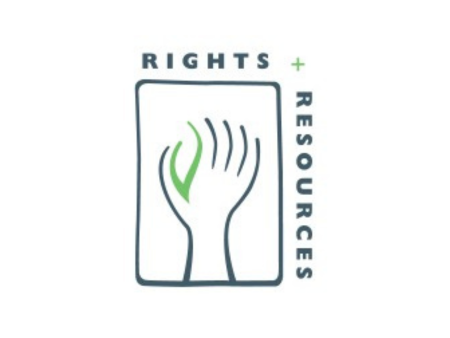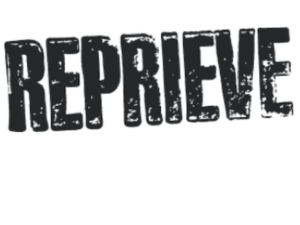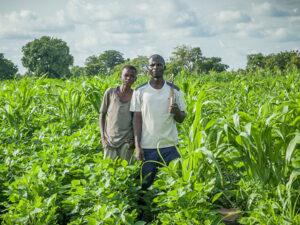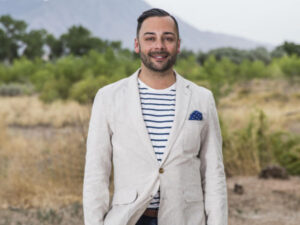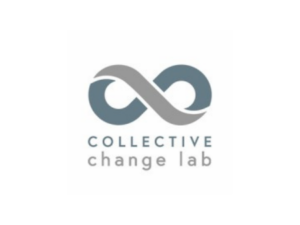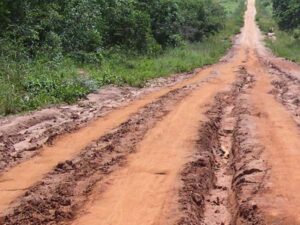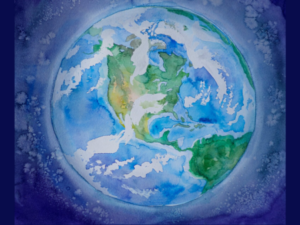Rights and Resources Initiative is a coalition of Indigenous communities and Afro-descendant people’s rights organizations and their allies advocating for the land and resource rights of Indigenous peoples and local communities.
Madiha Waris Qureshi of Rights and Resources Initiative spoke with Priyanka Shankar on February 10, 2023. Click here to read the full conversation with insights highlighted.
Priyanka Shankar: Could you introduce yourself and tell me how you’d like the world to know who you are?
Madiha Waris Qureshi: I am Madiha Waris Qureshi. I lead the strategic communications program at Rights and Resources Initiative, or RRI, which is one of Skoll’s grantees. We are a global coalition of Indigenous communities and Afro-descendant people’s rights organizations and their allies. We have about 150 organizations in our network. I work with the secretariat of this coalition, which is located in Washington DC and in Montreal. I’m originally from Pakistan. I grew up in Karachi but I’ve been in the DC area for the last 15 years, and I’ve worked with RRI in two stints. I was here for four years and then left, did grad school, then came back totaling more than six years now. I am a storyteller, former writer, former freelance journalist and communicator in international development. I’ve been leading the communications team here since 2020.
Priyanka Shankar: Can you tell me a little bit more about the specific problem that you’re addressing in your work?
Madiha Waris Qureshi: RRI advocates for the land and resource rights of Indigenous peoples and local communities. So basically these communities form some of the most vulnerable people in the world. They have customary rights, so traditional rights to the lands that they’ve lived on for generations. But often governments or private sector or other actors often grab those lands from them or violate their rights because they might not have legal claims to those lands. So they might not have a piece of paper that shows that they have property rights, even though they have lived and protected those lands for many, many generations. So we advocate on their behalf. RRI supports research, collecting evidence that supports the rights of these communities to their lands. And also supports and builds a case for the fact that when these communities have secure rights, then they’re able to protect their lands better.
So these vast natural resources, biodiversity forests that they manage and have lived in, they’ve been protecting them and conserving them far better than governments or other actors have. So one thing that we do is we collect and publish this evidence to show the world that there is a scientific case to be made for securing their rights. The second thing we do is we support legal advocacy for legal rights by our partner and collaborator organizations that are in Asia, Africa, and Latin America. So our focus is on the global south and these three continents where we have partner and collaborator organizations. These are typically smaller organizations that are formed by Indigenous peoples and local communities themselves to protect their rights. And we provide them with the support they need in order to conduct their work, their advocacy. And the third thing we do is we also bring together the various actors and stakeholders who can be instrumental in securing these communities rights.
We conduct dialogue, we facilitate connections between people who might not usually talk to each other, who are on the opposite sides of the polls, but we play that role of facilitator to bring them to the same table. For example, we’ll bring community leaders to talk to government, forest service leaders, for example, who might be targeting them to displace them to create a protected area on their land. We will bring them to the table with private sector actors who might have purchased their land for development projects from the government, even though these communities were living there. But then they stand to be displaced because of those projects. So we’ll bring together those kinds of stakeholders and we’ll have them, we’ll force them to talk to each other and come up with a solution. So we take a very facilitating sort of catalyzing approach toward making an impact.
At the core we are a human rights organization. Our approach is very different in the sense that a lot of the work that we do is behind the scenes, and it’s boring, oftentimes it’s very long term. But the relationships that we build and the advocacy that we do for years and years does ultimately lead to legislative reform. So, for example, in the Democratic Republic of the Congo, recently a law was passed that recognizes Indigenous pygmy people’s rights to their lands. That was a huge legal victory for us.
It was more than 10 years in the making though. So these things take time. It’s not always glamorous work, but somebody has to do it, and we’re there to support that work on the ground and also on an international forum. One other thing we do is we bring visibility to community leaders from these countries that we work with on international platforms like the UNFC Climate Conference or the UN’s biodiversity process. So all these leaders sitting and negotiating on behalf of countries and entire societies, we try to bring community leaders into the mix and into those conversations.
Priyanka Shankar: Can you talk about an example and take us through how you heard about the case, how you went through it, and a little bit about what was challenging. But at the end there’s impact and how do you measure that success?
Madiha Waris Qureshi: There are so many actors that play a role in the impact that we make. I’m the person who’s basically just communicating their impact. I’m not the one making things happen on the ground. Those are our partners and our collaborators who are local organizations that are working on the ground. But we have different metrics depending on the type of activity that we’re supporting. To give you an example, in Kenya for example, we have been supporting this very small organization that represents the Ogiek Indigenous community that lives in Mount Elgon, which is an area bordering Uganda. So this is a forest that this community has lived in and protected for generations. Most of their land was taken away by the government and made into protected areas, which basically means they created these conservation areas and kicked people out of the land.
And the forest service took over, and then these communities had to be displaced. They do have some land left, but most of it was taken by the Forest Service. So then they started to reach out to human rights organizations and they made the case. So we stepped in, we supported them in launching a campaign, in launching a legal case against the government. And after many, many years they were able to win a judgment by a regional human rights court, which the government is supposed to implement. So the implementation process is still going on, but at least the community was recognized as the legal rightful owners of the land. We supported that project by funding it. Since we have connections on the ground, we also act as a sub granting body where we connect with local partners and we give them funding and technical support to do their job.
It’s kind of acting as an intermediary, but an intermediary who’s very, very involved on the ground with the final actor who’s actually implementing the work. So the legal advocacy for the Ogiek community would be one example where we were able to get them legal recognition, just the way in the DRC, this community was recognized. So that’s one way of measuring success. And then we also have been bringing Ogiek leaders into international and regional conferences to make their case. For example, last year there was an Africa Protected areas conference, which was basically organized by large conservation organizations and governments, African governments, it was called APAC. This conference was where all these governments came together with large conservation organizations to talk about how they can protect their resources, their natural resources from dwindling, especially when you talk about the global conservation goals.
There’s a 30 by 30 target, which has been set by the UN and other organizations that says we have to protect 30% of the world’s most biodiverse areas by 2030, which is coming up really fast. It’s not going to happen. But there’s this ambitious target, and governments are scrambling to create protected areas, a lot of which have people living in them. There’s no land that’s vacant, there are always communities living. What do you do with those communities? You don’t just kick them out and send them elsewhere, especially when their entire lives are dependent on the land. I think it goes to show this is a very small organization that has never had a lot of funding. They barely have internet connectivity because Mount Elgon is very remote. So for them to have their story told to an international audience and random people all over the world looking at their story was a big deal.
Those are some of the different ways we try to help these organizations on the ground. And then, there’s all kinds of ways we measure our impact. Winning a legal case is one thing, but then sometimes it’s also very subjective, like giving a capacity building training to 50 community members on how to understand the current laws and how to present their case, or how to file applications to claim their land. Those kinds of things are very hard to measure, but we’re still doing those, and we do measure them in different ways, but it’s hard to say one way we measure our impact. Of course, the donors that we work with have their own reporting mechanisms that we follow, and we try to show our impact to them in those ways.
Priyanka Shankar: Have you learned any lessons for the rest of the world with these approaches that you’ve shared, are there lessons to be learned?
Madiha Waris Qureshi: Absolutely. I think one major lesson is that we are a northern based organization, we’re based here and we’re sitting very far away from the communities that we’re trying to help. We have to constantly learn from them as opposed to telling them what to do. We can’t just go in and tell this small community in Nepal that’s been doing the heavy lifting for many, many generations trying to protect its forests. Despite the government or conservation organizations constantly coming in and telling them what to do. They know what they’re doing. So it’s been a constant learning process for me as a communicator, for everybody that works with RRI. And we have to be very humble and we have to be ready to put our biases and prejudices aside. I think a lot of times northern based organizations, and especially Western, American organizations, tend to think we know better.
We have the technical words, we have the jargon and we know what carbon markets are or biodiversity conservation is. But when we go in to work with the communities and meet with them in person, they might not speak English at all or speak very broken English. They might not have all those technical jargon and words, but what they do have is traditional knowledge that is rooted in their lived experience, and that is irreplaceable. No matter how many PhDs somebody goes and does in conservation or in environmental resource management, they will not have that lived experience, the knowledge that these communities have gathered. So for example, traditional medicine or adapting to climate change, you have pastoralists who have had their grazing lands dried up because of climate change and they know how to adapt to it. Nobody else is coming in and telling them through scientific research how to do it because they’ve lived through it.
We have communities replanting trees in deforested areas. We have communities that are patrolling their lands day and night to make sure that illegal loggers don’t come in and cut down their trees. And they have their own systems, they have their own community leadership and they decide who’s going to patrol, who’s going to do what. They have a lot of systems in place which we can learn from. And I think that’s probably the biggest lesson for me, that kind of humility. We always have to keep reminding ourselves, just because we’re sitting in Washington DC, we don’t know better.
Priyanka Shankar: I think that’s been quite a debate in the aid world, development and NGOs as well, this aspect of decolonizing aid or listening to the people.
Madiha Waris Qureshi: And language is a huge part of it. One thing that I come across a lot is if we have a community leader who has been able to go to good schools, well good schools is a very subjective term, but who’s been able to go to western schools for example, and speaks good English, is more likely to get everybody’s ears and is more likely to be invited to global UN conferences or be interviewed by media organizations because most journalists only speak English, French, or Spanish . So there is such discrimination. A lot of Indigenous and community leaders lose out on opportunities for global visibility because they don’t speak the language, and the right language for global platforms.
As a coalition, we try to be very inclusive, but we fail all the time because we’re not inclusive enough sometimes to give a platform to someone who only speaks Indonesian or only speaks Nepali or speaks a regional language in India of hundreds of languages in that country where we have Adivasi communities that don’t speak Hindi, which is the official language or English. I think one way to look at it is language. And we have to constantly challenge ourselves. It makes our job more difficult to translate our reports into multiple languages. It’s expensive, but it’s worth it.
Priyanka Shankar: As a human rights organization, challenges are going to be plenty, whether it’s raising funds, working with these communities, understanding them. How have you made your way through these challenges and learned lessons from them?
Madiha Waris Qureshi: There are so many different types of challenges. I can speak from a communications manager’s point of view. I can speak to some of the challenges we’ve had in our program. Internet connectivity of the people that we work with and not being able to get timely responses, timely reporting, [because] donors have their own deadlines. And we’re working with community leaders that are wearing many hats. For example, if someone is the only person doing their organization’s comms and finances and multiple other functions, and they also have to write an interim report for the donors, those delays are a part of the job and we have to be more empathetic and understanding. One other thing that we have to constantly keep thinking about is the technical capacity of our partners on the ground and how limited that is and how difficult it is to comply, sometimes with the stringent guidelines that we give them.
We might send them five pages of instructions for a donor report, for example. And there’s of course language barriers, there are connectivity barriers, there’s just not enough people. So one solution to this is, instead of just throwing money at the problem, we actually train community leaders, community members, and the youth among them especially. We cultivate younger folks in the community and we provide them with opportunities for training. For example, one project that we funded in Indonesia and for an Indonesian community was that we funded a paralegal training program for a community where young community members were able to get paralegal training so that way they could work on legal advocacy because this community was fighting a land rights case in the court against the government. So we trained their community members.
Our partner organization, which is a human rights law firm, took up the task of training them in paralegal skills so that they could work on the legislative reforms as opposed to hiring an expensive law firm. But those kinds of things take time and the results take time. A training like that is not a one week job. A communications and media storytelling training, for example, is difficult to put together and it takes time.
Another thing is, you can’t just do these things virtually. That’s another challenge. Connectivity is problematic. Time zones – Indonesia, for example, is about 14 hours from DC – so it’s really difficult to have people attend meetings virtually. So at some point, one of us has to go in person and talk to them and understand their issues, and then we can create solutions which are actually relevant to them instead of sitting here and just imagining what they need. So yeah, face-to-face interaction, there’s just no alternative to that. It’s irreplaceable. So, Zoom is definitely not a replacement to face-to-face interaction. And COVID made that very difficult in the last few years, but luckily things are getting better now in that context.
Priyanka Shankar: In the coming years, how do you see your organization engaging in advanced systems level change?
Madiha Waris Qureshi: We’re an organization that’s constantly growing partners and connecting and facilitating networks is part of our mission. At the core, we play that connector role within the coalition. We’re always going to keep up with that pace. We can’t not. That’s part of our core vision. In terms of technology, that’s an ongoing process for us for learning and adapting ourselves to new technology and then transferring it to our partners on the ground. Systems and process training most importantly. Building the capacity of our partners and collaborators is a huge undertaking. It’s a very important part of our next five year strategy. We actually just released our five year [strategic] plan, every five years we collaboratively come up [with a new five year plan with] our coalition partners based on the situation on the ground.
We also engage in a very extensive annual planning process where we revisit our current project if things need to change, if new opportunities have arised, if opportunities have closed. Sometimes there’s a short window of political action. So in countries there’s a big election coming or there was a big election win, which changes the context on the ground. All of those things we consider every year, from September through November we have an extensive annual planning process in each of our three regions. So our plans will change based on that. Even our focus countries change sometimes.
One of the things that’s in our next five year plan is to build more north-south collaboration in the broader Indigenous community sector. We brought together folks from North America, from Canada and the U.S. Cherokee tribe with Indigenous folks from India and from Latin America, from parts of Africa, and Nepal. We had all these people in a space late last year for the first time, and they got to talk to each other and share their challenges. So there’s a lot to learn from movements. And there are ongoing movements in the global north still. I mean, we tend to think they’re in a better place, but they’ve already lost a lot of their lands and they have a lot to teach to the movements in the global south where Indigenous peoples are still fighting for their land rights.
Click here to read the full conversation with insights highlighted.
Priyanka Shankar is an independent journalist currently based in Brussels. She mainly covers stories about human rights, migration and Europe’s relations with Asia. Outside a newsroom you can find her rambling along mountains or scuba diving.
* This interview has been edited and condensed.
Gain insights from other indigenous-led social innovation initiatives.

